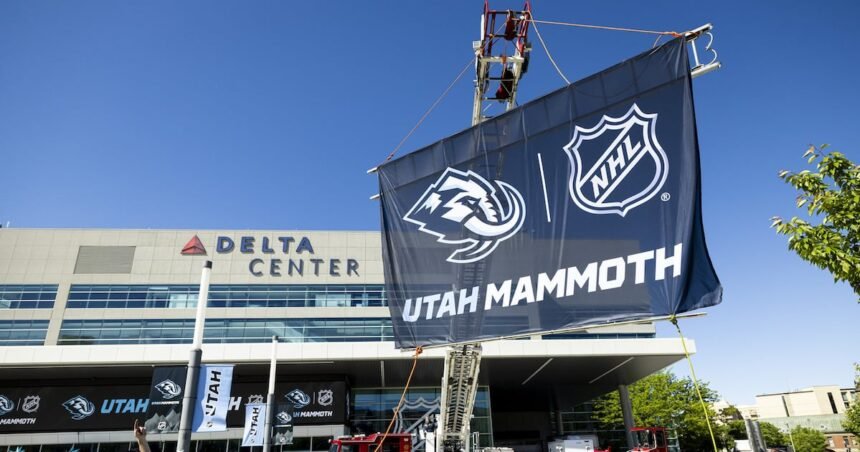Utah’s capital city approved the terms of a new lease agreement with a Smith Entertainment Group affiliate that could keep the Utah Jazz and Utah Mammoth downtown for the long haul.
Members of the Salt Lake City Community Reinvestment Agency board of directors, who are also City Council members, voted Tuesday to approve terms of a new Delta Center lease. The deal includes provisions that can extend the agreement for as long as 100 years for as low as $1 per year.
“The dollar amount has never been the purpose of this lease. It’s about long-term value that we see in the arena and in our downtown core,” said Salt Lake City Mayor Erin Mendenhall, as she presented the proposed lease agreement. “It’s about ensuring that this iconic venue … remains a benefit to our community in new and meaningful ways.”
The final terms were hashed out in the months and days leading up to Tuesday’s meeting. Jazz Arena Investors, an affiliate of Smith Entertainment Group, held a lease of $1 per year from an agreement that the Larry H. Miller Company reached with the Community Reinvestment Agency in 1990 to build the arena on land owned by the agency.
The lease was set to expire in 2060. Under the new agreement, Jazz Arena Investors can rent the land for as little as $1 per year, as long as it keeps up with certain provisions over the next 30 years.
These include requirements that all games are held at the Delta Center unless maintenance issues are preventing that from happening, or an outdoor venue event like a “Winter Classic” or “Stadium Series” event that the NHL typically holds.
That’s one of the items outlined in last year’s participation agreement tied to the “sports, entertainment, culture and convention district” centered in and around the arena. Other items included in the agreement are also included in the lease.
Jazz Arena Investors are also permitted to make any arena modifications “it deems suitable,” as long as it doesn’t “materially and negatively affect the operational capability or structural integrity of the improvements,” according to the document. That’s on top of several other logistics tied to the arena.
After 2055, the arena owner can extend the lease every 10 years for up to seven times, accounting for the remainder of the 100-year deal. After 30 years, the Reinvestment Agency could assess “market rent” rates if conditions aren’t met. That rate would be determined through a third-party appraiser.
The backbone of the agreement isn’t much of a surprise, but it could be slightly longer than what was initially proposed.
Smith Entertainment Group requested a 99-year lease agreement with the Community Reinvestment Agency in April 2024, as part of its application to participate in a downtown revitalization zone process. Having a new lease was viewed as a way to ensure that the city receives the benefits outlined in last year’s agreement.
“With this, (there’s an) opportunity to potentially ensure that the investment from Salt Lake City residents are protected, and ensuring we’re on the same page,” Salt Lake City Council Vice Chairman Alejandro Puy told KSL.com on Monday.
Tuesday’s vote comes as the arena undergoes a makeover to fit both the Jazz and Mammoth.
The first phase of a three-year renovation project began in April. It includes an improved lower bowl to better handle hockey and basketball games, as well as the groundwork for a future parking garage that will be built on the southwest corner of the building. The remaining phases will be completed over the next two offseasons.
Other pieces of the massive downtown overhaul have also fallen into place this year.
Utah Department of Transportation officials say they’re zeroing in on a plan to lower 300 West outside the arena to make way for a new pedestrian plaza linking it to the rest of the “sports, entertainment, culture and convention” district. Smith Entertainment Group reached a $55 million agreement with Salt Lake County earlier this year to acquire a piece of the Salt Palace Convention Center to move forward with the project.
The agreement was reached a few weeks after the state signed off on the complete $1.8 billion “reinvestment zone” surrounding the arena.











